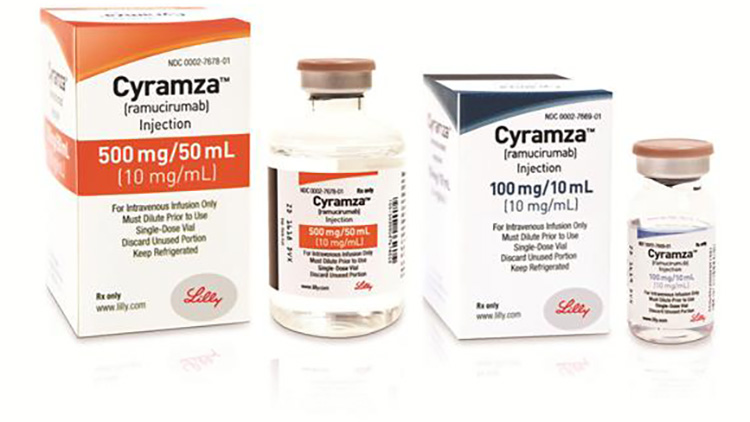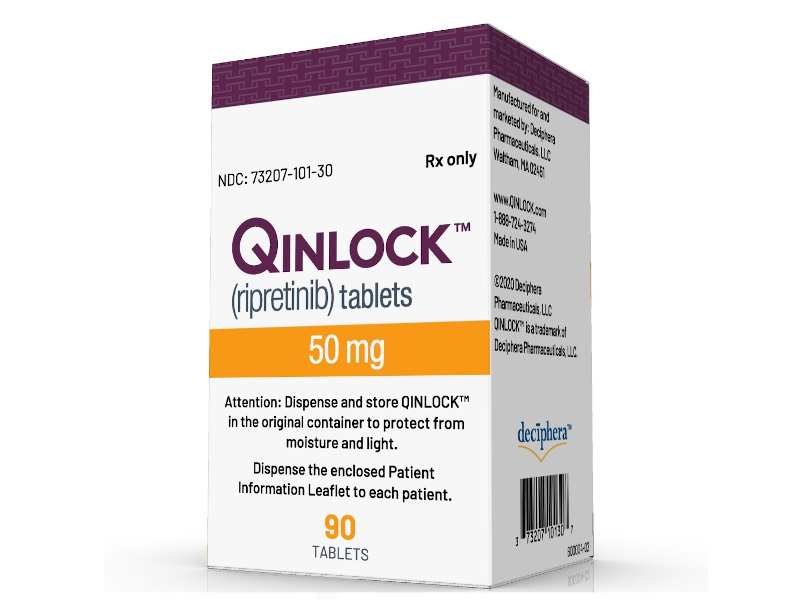Cyramza (ramucirumab) vs Qinlock (ripretinib)
Cyramza (ramucirumab) vs Qinlock (ripretinib)
When comparing Cyramza (ramucirumab) with Qinlock (ripretinib), it is important to note that these medications are used to treat different types of cancer. Cyramza is a vascular endothelial growth factor (VEGF) receptor 2 antagonist used for various cancers, including gastric cancer and non-small cell lung cancer, often in combination with other chemotherapy agents. On the other hand, Qinlock is a kinase inhibitor specifically approved for the treatment of advanced gastrointestinal stromal tumor (GIST) after prior treatment with 3 or more kinase inhibitors, including imatinib. The choice between these medications would depend on the specific type of cancer being treated and the patient's treatment history. Patients should consult with their oncologist to determine the most appropriate treatment option based on their individual medical condition and the specific characteristics of their cancer.
Difference between Cyramza and Qinlock
| Metric | Cyramza (ramucirumab) | Qinlock (ripretinib) |
|---|---|---|
| Generic name | ramucirumab | ripretinib |
| Indications | Gastric cancer, non-small cell lung cancer, colorectal cancer, hepatocellular carcinoma | Gastrointestinal stromal tumor (GIST) |
| Mechanism of action | VEGFR-2 antagonist; angiogenesis inhibitor | KIT and PDGFRα kinase inhibitor |
| Brand names | Cyramza | Qinlock |
| Administrative route | IV infusion | Oral |
| Side effects | Hypertension, diarrhea, headache, bleeding | Alopecia, fatigue, nausea, abdominal pain |
| Contraindications | Hypersensitivity to ramucirumab or any component of the formulation | Hypersensitivity to ripretinib or any component of the formulation |
| Drug class | Monoclonal antibody, antineoplastic agent | Tyrosine kinase inhibitor |
| Manufacturer | Eli Lilly and Company | Deciphera Pharmaceuticals, LLC |
Efficacy
Efficacy of Cyramza (Ramucirumab) for Gastric Cancer
Cyramza (ramucirumab) is a monoclonal antibody designed to target and bind to the vascular endothelial growth factor receptor 2 (VEGFR2), which plays a key role in angiogenesis, the process by which tumors develop new blood vessels to sustain growth. The efficacy of Cyramza in gastric cancer was demonstrated in a pivotal Phase III clinical trial known as REGARD, which evaluated the drug as a single agent in patients with advanced gastric cancer who had progressed after initial chemotherapy. The results showed a statistically significant improvement in overall survival compared to placebo. Following this, the RAINBOW trial, which combined Cyramza with paclitaxel, also demonstrated an improvement in overall survival and progression-free survival in patients with advanced gastric or gastroesophageal junction adenocarcinoma who had progressed after initial platinum- or fluoropyrimidine-containing chemotherapy.
Efficacy of Qinlock (Ripretinib) for Gastric Cancer
Qinlock (ripretinib) is a kinase inhibitor that has shown efficacy in treating gastrointestinal stromal tumors (GIST), a type of tumor that can occur in the stomach (gastric GIST). However, it is important to note that Qinlock is not specifically indicated for the treatment of gastric cancer, but rather for the treatment of GIST. The efficacy of Qinlock for the treatment of GIST was evaluated in a multicenter, international, randomized, placebo-controlled Phase III trial called INVICTUS. This trial included patients with advanced GIST who had received prior treatment with other targeted therapies. Ripretinib significantly improved progression-free survival compared to placebo. While these results are promising for patients with GIST, they do not directly translate to the efficacy of Qinlock in treating gastric cancer, as gastric cancer and GIST are distinct entities with different pathologies and treatment approaches.
It is crucial to differentiate between gastric cancer and gastrointestinal stromal tumors when considering the efficacy of these drugs. While Cyramza has been specifically approved for use in certain patients with advanced gastric cancer, Qinlock's approval and demonstrated efficacy are related to GIST, which may also arise in the stomach but represents a different disease. Therefore, the information on Qinlock's efficacy is not directly applicable to gastric cancer but is relevant to gastric GIST.
Patients and healthcare providers should consult the latest clinical guidelines and the prescribing information for Cyramza and Qinlock for the most current data on their efficacy and approved indications. Additionally, ongoing research and clinical trials may provide further insights into the efficacy of these drugs for various types of cancer, including gastric cancer and GIST.
Regulatory Agency Approvals
Cyramza
-
European Medical Agency (EMA), European Union

-
Food and Drug Administration (FDA), USA

-
Health Canada

-
Therapeutic Goods Administration (TGA), Australia

-
Medsafe (NZ)

Qinlock
-
European Medical Agency (EMA), European Union

-
Food and Drug Administration (FDA), USA

-
Health Canada

-
Therapeutic Goods Administration (TGA), Australia

Access Cyramza or Qinlock today
If Cyramza or Qinlock are not approved or available in your country (e.g. due to supply issues), you can access them via Everyone.org.
How it works

Make an enquiry
Choose the medicine you want to buy, answer a couple of questions, and upload your prescription to speed things up. We’ll get back to you within 24 hours.


Make an enquiry
Choose the medicine you want to buy, answer a couple of questions, and upload your prescription to speed things up. We’ll get back to you within 24 hours.


Breeze through the paperwork
We'll guide you through the required documents for importing unapproved medicine, ensuring you have all the necessary information.


Get a personalized quote
We’ll prepare a quote for you, including medicine costs and any shipping, administrative, or import fees that may apply.


Receive your medicine
Accept the quote and we’ll handle the rest - sourcing and safely delivering your medicine.

Some text on this page has been automatically generated. Speak to your physician before you start a new treatment or medication.
Let's talk
If you have any questions, call us or send us a message through WhatsApp or email:
Contact us




